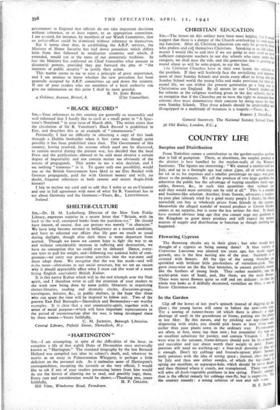SHELTER-CULTURE SIR, —Dr. H. M. I.ydenberg, Director of the New York
Public Library, expresses surprise in a recent letter that "Britain, with its back to the wall, exempted books from the purchase-tax." He should have known, of course, that our gesture was merely "in character." We have long become attuned to belligerency as a normal condition, and have so adjusted our affairs that life goes on much as usual during daylight, though after dark there is some departure from normal. Though we know we cannot hope to fight the war to an end without considerable increase in suffering and destruction, we have no conception that we could ever be defeated Hence, every- one tries to pull his weight, and—following our national habit of com- promise—we carry our peace-time activities into the war-zone and there adapt them. We recognise that the war has made—and will make more—alterations in our social structure, but we see no reason why it should appreciably affect what I must call (for want of a more fitting English eauivalent) British Kultur.
It is this native Kultur which will in the end triumph over the Nazi spirit, and I therefore write to call the attention of your readers to the work now being done by some public librarians in organising shelter-libraries, reading and dramatic circles, discussion-groups, travelogues, lectures, &c., in public shelters, in the hope that those who can spare the tune will be inspired to follow suit. Two of the poorest East End Boroughs—Shoreditch and Bermondsey—set worthy examples. It is. clear that a real community-spirit, together with a sense of social purpose—which will have important repercussions in the period of reconstruction after the war, is being developed there by these means.—Yours faithfully,






























 Previous page
Previous page